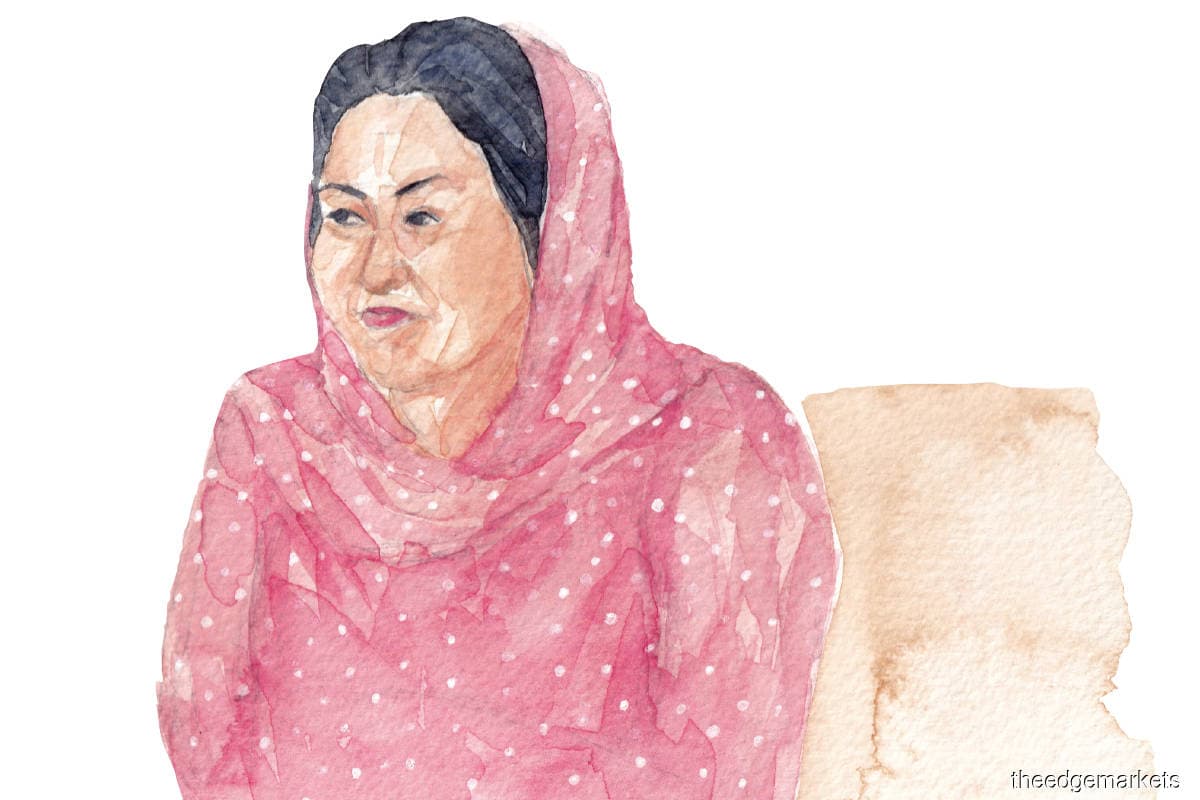
This article first appeared in The Edge Malaysia Weekly on September 14, 2020 - September 20, 2020
Civil servants both respected and feared Datin Seri Rosmah Mansor, who was at the “centre of power” for nearly a decade when her husband Datuk Seri Najib Razak was the most powerful man in the country. An ambitious woman, she was not above using her position and influence to solicit money — ostensibly in the form of political donations — in exchange for her help in securing government contracts, revealed Datuk Rizal Mansor, her former special aide, who worked closely with her over the same period.
Indeed, her influence in Putrajaya raised eyebrows almost immediately after Najib took office as prime minister in 2009 as Rosmah had Najib’s respect and could sway his decisions.
Testifying last week, Rizal told the High Court about Rosmah’s increasing trust in him as he progressed in his role as special officer to the wife of the prime minister.
Rosmah was a smart, capable and influential figure who had access to the prime minister, Rizal said, and many businessman and contractors would approach her for help to lobby for government projects. In exchange, they went to her bearing gifts, including cash. This was a “common practice” in the political world, said Rizal, 46, the prosecution’s 21st witness in Rosmah’s graft trial.
“As the prime minister’s wife, there were many who wanted to meet her. Most of them were businessmen and contractors who wanted to lobby for projects owned by the Malaysian government. They would meet her and have good relations with her in the hope of getting her assistance to convince [her husband] Najib to unlock opportunities for them to obtain the projects.
“I gained Rosmah’s trust and was assigned by her to receive some of the gifts that included cash. As all these were given on the basis of ‘political contributions’, I did not consider it an offence to receive them.”
The level of trust and power accorded to Rizal as a special aide was so high that he was not worried when he heard the Malaysian Anti-Corruption Commission (MACC) had begun investigating Jepak Holdings Sdn Bhd managing director Saidi Abang Samsudin and consultant Rayyan Radzwill Abdullah in March 2018 in regard to the RM1.25 billion solar hybrid project awarded to the company.
However, after hearing of Saidi’s and Rayyan’s arrest shortly after the 14th general election in May 2018 and the change of government, Rizal panicked and fled to Jakarta, Indonesia.
“After two to three weeks, the MACC contacted me and asked me to report to the office to assist them in the investigation. After long thought, I figured I should return to Malaysia. I knew I could not run away for long and must eventually face the situation. When I returned, I was remanded for six days and eventually charged in court,” he says.
Rizal was previously jointly charged with Rosmah in the latter’s corruption case involving RM6.5 million in kickbacks from Jepak over a solar hybrid project for 369 rural schools in Sarawak. However, the prosecution decided to drop the charge against him in January this year and subsequently made him a witness to the case.
FLOM’s influence at the centre of power
Rizal was hired into a newly minted division called “First Lady of Malaysia” or FLOM in 2009 after Najib took office as prime minister. Employed on a contract basis as a media relations officer, he assumed a number of positions but served as the special officer to Rosmah throughout Najib’s time in office.
Concerned about her public image, she constantly sought media coverage of activities carried out by her, and in 2012, instructed Rizal to form a team of cybertroopers to defend her from online slander and negative reports. To bankroll the operations, she forked out a cool RM100,000 a month.
“There were a lot of negative media reports against her on social media regarding her integrity and her position as the prime minister’s wife. These included her expensive handbags, the lavish wedding of her daughter Nooryana Najwa Najib, her financial interests in some government projects, the use of government jets for unofficial business, as well as allegations that she was the boss of her husband and then prime minister Najib, and that she was the real prime minister,” Rizal testified, adding that at some point, the Prime Minister’s Office asked the FLOM division to lower Rosmah’s profile in the press.
Rizal’s defence of Rosmah included statements to the media and postings on his Facebook. So happy was Rosmah with his performance — particularly his defence of her during the 13th general election in 2013 — that she gave him a Datukship in 2014.
The FLOM division was both respected and feared, according to Rizal, not only due to Rosmah’s fiery reputation but also because of its head, Datuk Seri Siti Azizah Sheikh Abod, who was stern with government officers.
“Whatever that was requested by the FLOM division would be implemented by the various government agencies immediately without much bureaucratic hindrance. Government agencies and officers appeared reluctant to reject requests made by the FLOM division or Rosmah. Civil servants would try to satisfy Rosmah and win her heart,” Rizal said, adding that she could influence Najib to transfer government officials who opposed or denied her requests to positions that were less important.
“These facts ... I obtained from my interactions with other civil servants. Initially, I thought the negative reports were either incorrect or just rumours to damage her reputation,” he said.
Rosmah, 68, faces three graft charges, namely soliciting a RM187.5 million bribe from Jepak and receiving payments of RM5 million and RM1.5 million from the company to help it obtain a solar hybrid project for 369 rural schools in Sarawak.
The cross-examination of Rizal continues before Judge Mohamed Zaini Mazlan on Sept 14.
Save by subscribing to us for your print and/or digital copy.
P/S: The Edge is also available on Apple's AppStore and Androids' Google Play.
